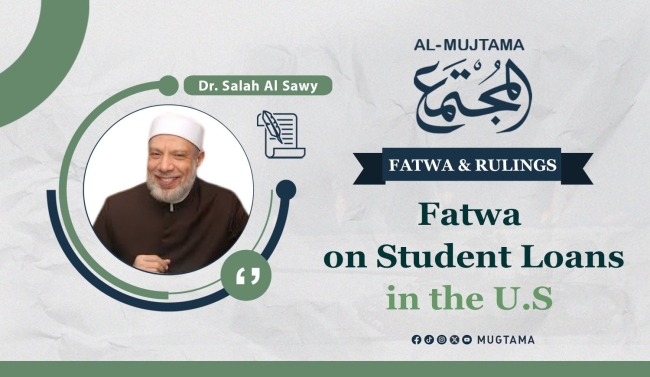Question:
My nephew lives in America and studies at university. He heard your fatwa regarding the ruling on interest-based loans for education in America and understood from it that such loans are haram (impermissible).
Does this mean that Muslims in America will remain unqualified and poor?
For what is the value of a bachelor's degree without pursuing higher education? Even teaching requires one or two more years of study to become a basic teacher.
So what about medical, engineering, and law students? According to your fatwa, are they not allowed to study?!
Here in the West, we pay hefty taxes for pensions, food, and living expenses. What do you suggest as a solution? Keep in mind that we can’t deduct the interest from taxes.
You have put the youth in a crisis. You need to correct your fatwa for them.
Answer:
In the Name of Allah, the Most Merciful, the Most Compassionate
All praise is due to Allah alone, and may peace and blessings be upon His Messenger.
It is actually they who have put themselves into a crisis due to their misunderstanding!
And you have put yourself in a similar crisis by following their flawed understanding, then by audaciously criticizing the scholars issuing fatwas without proper thought or verification!
We have issued a comprehensive fatwa from the Assembly of Muslim Jurists of America, clarifying the permissible cases for these loans. I will present it to you in its entirety so that you may correct your understanding first, then your son can correct his understanding accordingly.
You should also learn how to address scholars and avoid speaking against them in an inappropriate manner. May Allah forgive you and guide you to righteous speech!
Praise be to Allah, and may peace and blessings be upon the Messenger of Allah, his family, and companions.
After reviewing the issue of student loans, the Assembly of Muslim Jurists of America issued a ruling, which I present here word for word, as it contains the answer regarding student loans:
- The default is the forbiddance of interest-based loans regardless of whether these loans are for students or otherwise due to it falling under the clear interest that the scholars unanimously agreed, past and present, on its impermissibility. It is incumbent that all efforts are spent in finding permissible alternatives before leaping to the justification of urgency or need.
- In the world of Western Universities, academic scholarships are granted for the outstanding (students) and unable (to afford), alongside work-study opportunities that allow for combining between studying and earning, by which one can avoid falling into these loans. Also, there may be subsidized loans that the nation pays its interest if the student is able to repay all he owes within six months of his graduation. In addition, there are grants provided by some companions and institutions in exchange for employment contracts with it after graduation. It is incumbent that one spends his efforts in (trying) all this.
- If all of these are inexistent, and the interest-based loans are the only way to facilitate the beginning or continuation of a university education, or the only way to secure the Muslim communities need for what cannot be done without of professions and expertise, then this is considered an urgent necessity that removes the sin even though the ruling of impermissibility remains. This is upon the condition that the one forced to this isn’t an aggressor nor transgressor, and this is by giving the urgent need its proper estimate, and by continuing to search for a permissible alternative and breaking free of these interest-based loans when one is first able to do so in order to minimize the interest amount paid as much as possible. We emphasize the need to return to the people of Fatwa (i.e. qualified to passed a juristic opinion on Islamic Law) to estimate these needs and urgencies. It isn’t correct that for just anyone to assume the responsibility to do this, or to measure his need on the need of others.
And Allah knows best.
-------------------------------------------------------------
Taken from fatawaalsawy.com


